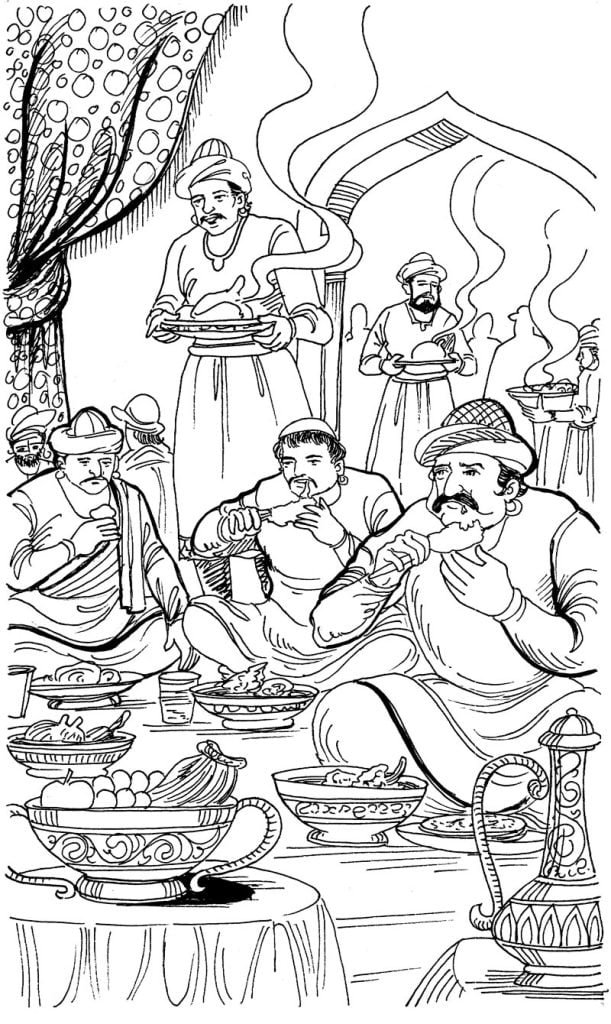(Deen-E-Ilahi)
At the end we shall discuss the new faith that Akbar introduced to seed the idea of secularism. As already mentioned Akbar used to interact with the scholars of different faiths to learn about various religions strains of thought.
He pondered over the feed back he had got from them and realised that no faith was perfect. Every faith had some positive points and some negative factors. Akbar was in search of a religion that could guide one spiritually and also show the way at the mundane level to create social atmosphere of amity and co-existence.

All the contemporary religions carried only partial truths and were full of contradictions. He wanted to put together the good points of all religions to create a new faith free of negative factors. In the month of March, 1582 Akbar called a meeting of religious leaders, amirs and clerics of all the faiths. He said—
“An empire ruled by a Supremo suffers if its people remain divided and opposed to each other at mental level…” He cited examples of religions having differences and their faithfuls were animous to each other. Then he added, “We have to unite the people but in a way that they live together peacefully yet keeping up their separate identities. The good points each religion has deserve to be retained. It will be a reverence to God and peace for the people. The state 2will also remain safe. The wise people gathered here many may give suggestions. I won’t do anything without your counsel.”
The sycophant type of courtiers spoke in one voice, “O Master of the World! Due to your exalted position and power you are one who is the closest to Allah. So, you must decide for us the faith, God, worship, prayer and the tenets.”
Emperor Akbar asked his trusted scholar Sheikh Mubarak to announce the royal declaration that for the entire empire a new faith will be conveyed from the court and all the subjects be ready to consider it and accept it.
In the face of the king most appeared agreeable but covertly many people were not ready to accept it or thought it improper. There were doubting minds according to historian Badayuni.
Raja Bhagwandas rose up and spoke, “I agree that Hindus and Muslims both have defective religions but we must know what this new faith is like. What has it got that we all may put our trust in?”
Akbar became thoughtful. He didn’t force Bhagwandas to accept the proposed faith.
The new faith was atlast initiated but in an optional form.
17 amirs and courtiers accepted the new faith called ‘Deen-e-Ilahi’
Initiation rite
To join the fold of Deen-e-Ilahi one had to write down a pledge and take vow in the following format—
“I….son of… of my own will and happiness, the truth of Islam and earlier faith ….. (inherited from forebears), give up and join the fold of Deen-e-Ilahi Akbar Shahi and accept four conditions of conduct regarding possessions, life, honour and faith.”
According to Ain-e-Akbari written by Abul Fazal—”Many points that were found common in all faiths were accepted in the new faith like creator and created were related and see as one soul unit.
Emperor is the religious head of the state and he discharges his duty considering it a way please God. The door to true path he opens. The true path that guides along the seekers of the truth.”
On Sundays new faithfuls were initiated into the new faith. Anyone writing to join the fold would take off his turban and put his head on the feet of the emperor. The emperor would raise the head of the person with his hands and put back turban on his head. The emperor then presented a sceptre that had engraving reading ‘Allahu Akbar!’ The faithful got a picture of the emperor he was supposed to wear as adornment in his turban.

The faithfuls greeted each other saying ‘Allahu Akbar’ and other replied with ‘Jalle Jalalahu’. A faithful performed his posthumous rites in advance so that he did not depend on any other one in his last journey.
On his birthday each faithful gave a feast as a religious act. Akbar advised against eating of flesh but he did not object to any person eating on his own preference. The restriction on the flesh eating was applicable on the month one was born in.
The faith did not catch the fancy of the people. It died out with the demise of Akbar. There were provisions of worship of Sun, Fire and Lamp. Akbar had banned cow slaughter. Death sentence was the punishment for violation.
There were many worship rituals adapted from Hindu traditions. Hence fanatical clergy didn’t like the new faith because to them it felt a blasphemy and anti-Islamic.
Akbar had got a lot of books prepared in respect of tenets of the new faith, prayer and worship rituals. During his life time the new faith ‘Deen-e-Ilahi’ had gained millions of followers. But after the death of Akbar the converted faithfuls returned to their original faiths. Without faithfuls the related literature could not survive and it also became history.

